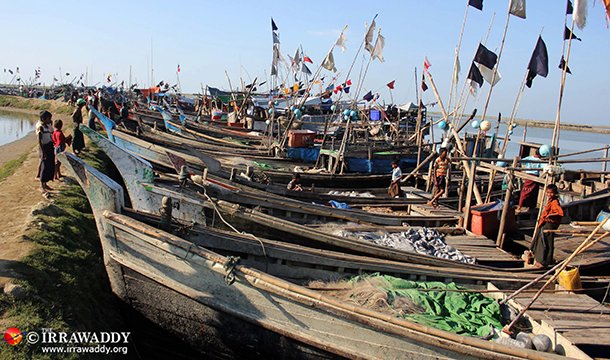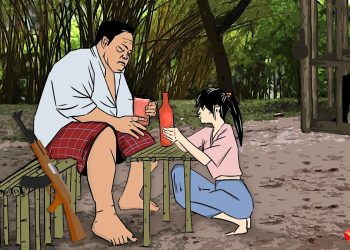RANGOON — Arakanese Buddhists blocked a move in early April to resettle Rohingya Muslims to an area emptied of Muslims during violence there last year, residents of the town told The Irrawaddy on Thursday.
The Arakan State government had planned to resettle the displaced Rohingya in Kyaukphyu Township, but decided to backtrack on their plans following a meeting with local Arakanese residents on April 5. Four villages in the township were selected for the resettlement of Rohingya, but local Arakanese rejected the plan.
“The people said at the meeting that they disagreed with the resettlement plan,” said Sayadaw U Eainnaw Basaka, an Arakanese Buddhist monk in Kyaukphyu. “They said they could not operate their businesses if the people [Rohingya] resettled there,” adding that the authorities said Rohingya would not be resettled if local Buddhists were not happy with the plan.
Ba Shein, an MP from the Rakhine Nationalities Development Party, said: “As I understand the situation, our Rakhine [Arakanese] people do not want [the Rohingya] to come back to the town.”
Abu Tahay, chair of the Union Nationals Development Party and a Rohingya leader, said the Arakanese would not allow permanent resettlement of Rohingya, adding that the only way temporary resettlement would be accepted by Arakanese is if the locations were far from Arakanese settlements.
One of the recommendations of a Burmese government-commissioned report into the violence in Arakan State last year said the two communities should be separated.
“That is not alright because we need to live peacefully together,” Abu Tahay said. “We need mixed living; at the end of the day that is the only sustainable solution for our diverse society.”
This tentative move to consult with local Arakanese on the resettlement of Rohingya could be used as a litmus test for future resettlement plans. Ba Shein said the four villages in Kyaukphyu are quite far away from the Buddhist-majority town, which would fit with the government’s plan to separate the communities. “The current places to settle the [Rohingya] people might take one hour to walk to from the town,” he said.
A local Arakanese resident in Hlay Pyaing Kwan, a village near Kyaukphyu, said he thought the Burmese government should provide aid to the Rohingya.
“These people need shelter before the rain comes,” the resident said. “We do not oppose this to help them as they are human beings as well. We wanted the government to resettle the people where it would not cause a problem with our people and cause more security to be deployed.”
There are two refugee camps in Kyaukpyu Township, one for Arakanese and another for Rohingyas. There are about 1,600 people in the Rohingya camp and several hundred in the Arakanese camp.
“The people do not have trust in each other,” said Kyaw Khin, the secretary from All Burma Muslim Federation. “This will make it difficult to implement a resettlement plan. It is important to build trust first.”
“There are about 150,000 Muslim people at seven camps in Sittwe [the capital of Arakan State]. They don’t have enough food. They have often told us about this and asked us for help,” he added.
A local government official involved in the resettlement plan told The Irrawaddy on Wednesday that the state government’s first job was to document the names and origin of all of the refugees before resettlement can go ahead.
“It might take three months to collect the list of the people,” the official said on condition of anonymity. “After this, the resettlement plan will be implemented. The humanitarian groups will provide aid for the people for six months after they have been resettled.”
President Thein Sein said on Monday that his administration will do everything it can to protect the rights of minority Muslims living in the predominantly Buddhist nation.
His government has been heavily criticized for not doing enough to protect Muslims or stop the violence from spreading since it began with clashes between ethnic Arakanese Buddhists and Rohingya Muslims in western Burma last year.
Abu Tahay questioned whether the Burmese government’s plan to separate Muslims and Buddhists in Arakan State could work. “Even though the resettled Rohingya will not be too far away from the towns, the policy will minimize building up trust again,” he said. “Reconciliation is not going to actually work without trust and the granting of full citizenship rights to the Rohingya.”
Human Rights Watch, based in New York, has accused the authorities including Buddhist monks, local politicians, government officials and state security forces, of involvement in what it described as an organized campaign of “ethnic cleansing” against the Muslims. The Burmese government has denied the charges. So far, hundreds of people have died and more than 135,000 people—almost all of them Muslims—have fled their homes since June 2012.

















